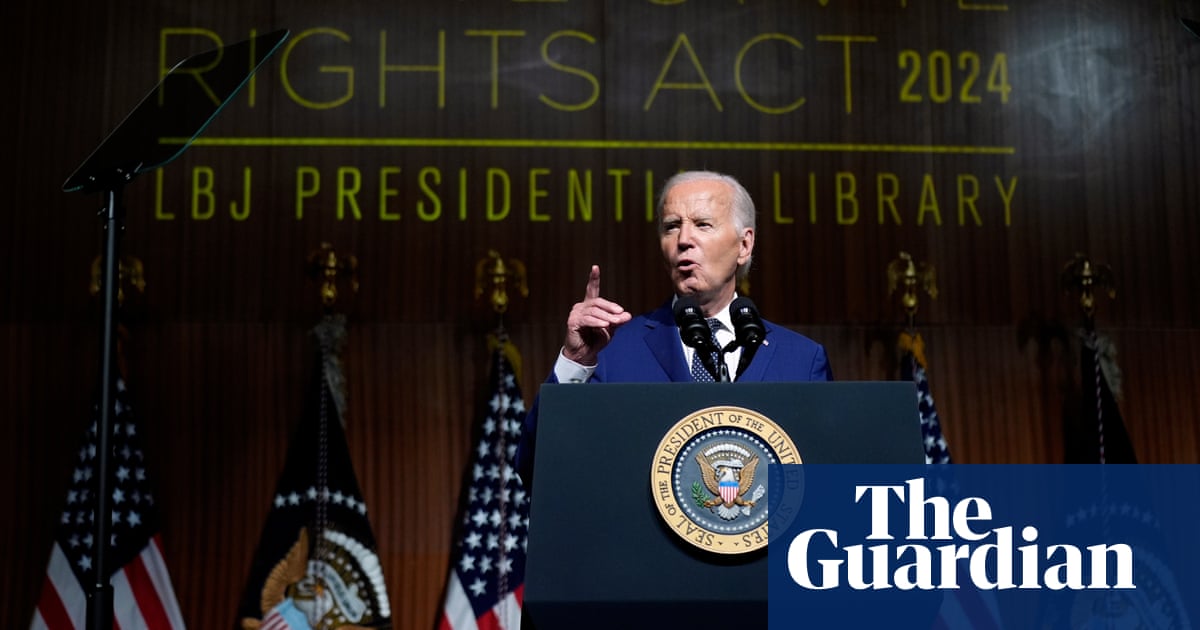Joe Biden marked the start of his lame-duck presidency with a significant speech outlining three reforms for the US supreme court – an important speech from a man who has spent decades as a staunch defender of institutions.
Biden’s remarks on Monday were laden with symbolism. He took the stage at an event commemorating the 50th anniversary of the signing of the Civil Rights Act, taking the stage in an auditorium at the Lyndon B Johnson Presidential Library and Museum, where Johnson gave his final public remarks. It was an effort to link his legacy to Johnson, another president who served as a master of the Senate, vice-president, and president before choosing not to seek re-election. Biden also sought to link himself to Johnson’s legacy of protecting democracy, noting Johnson signed both the Civil Rights Act in 1964 and the Voting Rights Act of 1965.
And Biden cast that legacy as one that is fundamentally opposed to what the supreme court is doing now. “In recent years extreme opinions that the supreme court has handed down have undermined longstanding civil rights and protections,” he said in his remarks. “This nation was founded on a fundamental principle: there are no kings in America.”
The reforms themselves are significant, but just a small sliver of what activists and others have been pushing for over the last few years. Biden would end lifetime appointments to the court, instead having the president appoint a justice every two years to an 18-year term. He would also adopt a binding and enforceable code of ethics.
Biden also supports a constitutional amendment to make it clear that the president is not immune from criminal charges for official acts – a response to the supreme court’s decision earlier this month in favor of Donald Trump.
“The court is mired in a crisis of ethics,” Biden said. “The court’s being used to weaponize an extreme and unchecked agenda.”
The first two proposals are unlikely to pass a narrowly divided Congress. The US constitution has not been amended since 1992 and it is extremely difficult to do so, requiring ratification by three-quarters of US states.
The power of Biden’s positioning may not be the substance but the legacy it leaves for other Democrats.
His past staunch defense of the court (in 1983 he reportedly called Franklin Delano Roosevelt’s effort to expand the court “boneheaded”; in 2020 he brushed off possible reforms) underscores how severe a threat to the rule of law the body poses. It moves an idea that was once seen as extreme to the mainstream of his party. Kamala Harris, the presumptive Democratic nominee, issued a statement on Monday supporting the reforms, as did a slew of left-leaning and progressive groups.
Chris Geidner, a legal journalist, noted that Harris had embraced reforming the supreme court within the first days of her candidacy. Ezra Levin, the founder of the group Indivisible, said Biden’s comments were “the entry point for many Democrats to start thinking and speaking more forcefully about the need for court reform”.
But just like his reversal on filibuster reform, or even his decision to end his presidential bid, Biden’s big decision seems to merely be a late acknowledgment of a reality that was clear to many for years. Stephen Vladeck, a law professor at Georgetown University, noted that the timing of Biden’s announcement may actually undermine its credibility.
Early in his term, Biden convened a commission to study supreme court reform that did not produce any recommendations. The commission, which was seen as a way of appeasing calls for reform without actually doing anything, completed its work in December 2021 – two and a half years ago. Biden’s announcement comes only after a series of extreme supreme court rulings – overturning Roe v Wade, expanding the right to carry a gun, undercutting the right to vote, and rolling back 40-year precedent empowering federal agencies to name a few – that Biden opposed.
“Any of those moments would have been understandable provocations for the president of the United States to take the lead in a national conversation about how powerful the supreme court has become – and whether, in the long-term, that’s a good thing for our constitutional system,” Vladeck wrote in his newsletter, One First. “By waiting until July of this year, with the presidential election less than four months away, the White House comes across a bit like Captain Renault in Casablanca – it’s shocked, SHOCKED!, to find that gambling’s going on in here.”
It was clear Biden – a little over a week after ending his candidacy – was thinking about his legacy on Monday. Towards the end of his speech, he recounted his career, walking through his decision to become a public defender in Delaware to his election to office with the first Black female vice-president.
“In two years, we’ll commemorate the 250th anniversary of the signing of the declaration of independence,” Biden said. “Imagine that moment and ask yourself: what do we want to be?”
